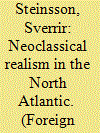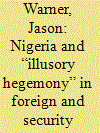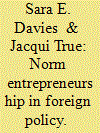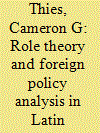|
|
|
Sort Order |
|
|
|
Items / Page
|
|
|
|
|
|
|
| Srl | Item |
| 1 |
ID:
153426


|
|
|
|
|
| Summary/Abstract |
The position of small states in international relations is traditionally described in terms of vulnerability and dependence. This dominant perspective is largely incomplete and inaccurate, because it disregards the element of exchange that characterizes the international linkages between many small and large states. In this article, I aim to outline and motivate an alternative model on the basis of which such relationships can be understood, which has been referred to as the international patron–client framework. After providing an overview of the contemporary academic literature on the role of small states in international politics, two sections follow in which I motivate the applicability of the patron–client framework to the field of international relations, and in which I explain the motives of both patron and client states. Subsequently, the accuracy and usefulness of the framework is examined on the basis of interview data gathered during field research in the three small client states of St. Kitts and Nevis, Seychelles, and Palau. The findings of this analysis indicate that the patron–client linkage offers a more fruitful model to study the relations between small and large states than the existing literature does, because it recognizes the element of exchange that such relationships entail.
|
|
|
|
|
|
|
|
|
|
|
|
|
|
|
|
| 2 |
ID:
153425


|
|
|
|
|
| Summary/Abstract |
The bureaucratic politics model of foreign policy decision making is predicated in large part by Miles' Law, which states that “where you stand depends upon where you sit.” That is, an actor's policy preferences can be predicted from his or her governmental position or role within the bureaucracy. Consequently, secretaries of state in the U.S. foreign policy decision-making process are then presumed to favor policy options emphasizing diplomacy and civilian efforts. However, Hillary Clinton has proved to be a consistent hawk during her tenure as secretary of state. Specifically, she was one of the strongest advocates of the use of military force in both Afghanistan and Libya. This paper examines Clinton's policy preferences in the context of the Afghanistan troop surge and the U.S. role in the international military operation in Libya to probe whether the secretary's failure to conform to Miles' Law is an anomaly or presents important questions regarding the possible disjunction between institutional and individual interests and their respective influences on actors' policy preferences.
|
|
|
|
|
|
|
|
|
|
|
|
|
|
|
|
| 3 |
ID:
153432


|
|
|
|
|
| Summary/Abstract |
The final half decade of the Cold War was characterized by a series of unexpected developments.1 Despite having subscribed to a Marxist–Leninist ideology for seventy years, in 1986 the Soviet Union responded to an economic downturn by adopting market-style economic reforms and liberalizing political reforms, called perestroika and glasnost, respectively. Even though the Soviet Union had previously seen the United States as inherently imperialistic, in the mid-1980s political rhetoric in the Soviet Union began to depict the United States as less of a mortal enemy and more of a partner in global security. Despite Ronald Reagan’s bellicose political rhetoric and commitment to render the Soviet Union’s nuclear deterrent impotent through the Strategic Defense Initiative (SDI), the Soviet Union sought to engage the United States in negotiations over the elimination of intermediate.
|
|
|
|
|
|
|
|
|
|
|
|
|
|
|
|
| 4 |
ID:
153424


|
|
|
|
|
| Summary/Abstract |
Focusing on ambassador appointments, the aim of this pioneering article is to address some fundamental questions about where men and women are positioned in diplomacy. Most of the gender-related diplomacy studies are limited to individual Ministry of Foreign Affairs and say little about diplomacy as an aggregate set of practices. We draw on theories of gender and positional status to ask whether there are gender patterns in ambassador appointments—with men occupying positions of higher military and economic status than women—much like the ones found in other institutions. Our analyses are based on a unique data set containing almost 7,000 ambassador appointments, made by the fifty highest ranked countries in terms of GDP in 2014. The results show that female ambassadors are less likely to occupy high-status ambassadorships than men. In short, gender patterns, linked to power and status, are present also in ambassador appointments. Diplomacy studies need to do much more to address the presence and impact of gender in international affairs.
|
|
|
|
|
|
|
|
|
|
|
|
|
|
|
|
| 5 |
ID:
153427


|
|
|
|
|
| Summary/Abstract |
Change at the level of the international system as a whole has always been a challenging subject matter in IR. This is especially true with regard to the link between foreign policy agency and systemic transformation—processes of societal re-creation at the global level of interacting states, societies, and human beings which are significantly shaped by socialized foreign policy agents. In IR and foreign policy analysis, this link is largely taken for granted. At the same time, the connections between foreign policy agency and systemic transformation are widely considered to be essentially intractable in epistemological and methodological terms. As a result, the link has been surprisingly undertheorized. In this article, I will try to show how a Deweyan (or pragmatist) understanding of social action in general and of causal analysis in particular might help to theorize the link. More specifically, I will mobilize Deweyan notions of situated creativity, historical contingency, and event-processes as sites of interaction which emphasize the “existential” character of systemic transformation and agential resocialization. The article also reviews available methodological tools of disciplinary inquiry in order to show that many of the necessary tools to examine the links between foreign policy agency and systemic transformation are actually at hand.
|
|
|
|
|
|
|
|
|
|
|
|
|
|
|
|
| 6 |
ID:
153428


|
|
|
|
|
| Summary/Abstract |
Three things are puzzling about the Cod Wars, three militarized interstate disputes spread over 20 years. First, they occurred between two democratic NATO allies, members of a Western security community. Second, Iceland came close to withdrawing its NATO membership and closing the US base on Icelandic soil, which would have adversely affected the balance of power in the North Atlantic and jeopardized Iceland’s core security interests. Third, Iceland, a microstate, won each of these disputes. Historians and political scientists have consequently found it problematic to account for these puzzling disputes. This study proposes a neoclassical realist account for the occurrence and outcomes of the Cod Wars. I argue that the disputes occurred due to (i) powerful domestic pressures on statesmen to escalate and (ii) elite miscalculation. As the disputes escalated and Iceland’s Western alignment was put at greater risk, statesmen in both countries, mindful of the dangers of realignment, were able to resolve the conflicts in the end. The outcomes of the disputes reflect how British statesmen were able to make greater concessions due to weaker domestic constraints than those faced by Icelandic leaders. Iceland therefore reached a highly favorable agreement in all Cod Wars.
|
|
|
|
|
|
|
|
|
|
|
|
|
|
|
|
| 7 |
ID:
153430


|
|
|
|
|
| Summary/Abstract |
Western observers of African foreign and security policy formation are often perplexed by African regimes’ reactions to insurgencies: the actions of the latter are often read to be duplicitous and self-damaging—and thus irrational—by the former. This article suggests that one cause for this perception rests in the often incomplete appreciation for certain Global South states’ self-identities as “regional hegemons,” which compels them to make foreign and security policy decisions based on maintaining the semblance of power projection capabilities to those in their intended spheres of influence. Particularly, this article suggests that when Global South states possess the realist attributes of a hegemon (military power, economic strength, and a large population) but lack the liberal attributes of a hegemon (the legitimacy for rightful rule), they often undertake a process here termed “illusory hegemony” or foreign and security policy prevarication. Yet, this pursuit of illusory hegemony frequently has the opposite unintended effect of undermining, rather than improving, the perception of rightful rule. This article combines an analysis of current events with International Relations theory and foreign policymaking analysis to present a case study on how Nigeria’s pursuit of its grand strategy of Pax-Nigeriana is being retarded by Boko Haram and the Chibok kidnappings, specifically as a result of Nigeria’s projection of “illusory hegemony.”
|
|
|
|
|
|
|
|
|
|
|
|
|
|
|
|
| 8 |
ID:
153433


|
|
|
|
|
| Summary/Abstract |
Theories of international norm diffusion rely on accounts of entrepreneurial action almost exclusively identified as normative non-state actors who persuade powerful states to change their behaviour. We argue that powerful state agents can (also) be moral norm entrepreneurs and explicate the foreign policy acts that make them significant agents of international socialisation. Unlike non-state actors who set the agenda by advocating for new norms, foreign policy leaders leverage their identity and position to advance the recognition and diffusion of already established norms by reframing the moral prerogative of the ‘national interest’. The paper examines a prominent case, namely former British foreign secretary, Mr. William Hague's promotion, through the offices of the British Foreign Commonwealth, of the international norm prohibiting use of sexual violence in conflict. We ask why and how did the United Kingdom and William Hague devote the attention and resources of the foreign policy apparatus to further this norm established more than a decade earlier in the Rome Statute of the ICC and by gender justice advocates?
|
|
|
|
|
|
|
|
|
|
|
|
|
|
|
|
| 9 |
ID:
153431


|
|
|
|
|
| Summary/Abstract |
This paper generates a framework to understand Latin American foreign relations through the use of Foreign Policy Analysis (FPA) role theory. The use of roles to describe and analyze regional interstate relations has previously been found in the literature on Latin America, but these studies have not taken advantage of the full range of concepts and theoretical implications associated with role theory to analyze the region. The paper develops a typology of states with associated national role conceptions (NRCs) and generates expectations for the sources of those NRCs, as well as elements of the role enactment and role location processes for Latin American states. The paper then illustrates the framework's applicability through a brief analysis of the role location process for Venezuela during the Presidency of Hugo Chávez. The analysis of NRCs selected by the leader of Venezuela, and their reception by role partners and the audience of interested states during the role location process demonstrates the fruitfulness of role theory for understanding Latin American regional relations. The analysis also suggests some modifications for FPA role theory itself as a result of the Venezuelan case.
|
|
|
|
|
|
|
|
|
|
|
|
|
|
|
|
| 10 |
ID:
153434


|
|
|
|
|
| Summary/Abstract |
This article integrates literature on strategic culture with literature on the domestic politics of foreign policy, illustrating how the interaction of culture and domestic political calculation can influence government foreign policy on participation in international military operations. Empirically, the article investigates the decision made by the Government of Finland to refrain from participation in the military intervention in Libya in March–April 2011. The Finnish decision-making illustrates that domestic politics, in particular the factor of election timing, can strengthen the feeling among decision-makers that they should follow the country’s strategic culture. The article ends with theorization on the domestic political conditions under which decision-makers are more or less likely to deviate from strategic culture.
|
|
|
|
|
|
|
|
|
|
|
|
|
|
|
|
| 11 |
ID:
153429


|
|
|
|
|
| Summary/Abstract |
Realist scholars have frequently expressed their displeasure at the actual practice of foreign policy and urged states to act in ways that are more consistent with realist insights on the nature of international politics. What does this foreign policy activism tell us about realist theory? For many, realist foreign policy activism suggests that the realist intellectual project is internally contradictory. Realist activism is said to undermine contemporary realism's claims to explain international politics “as it really is” the scientific validity of its predictions, and its rejection of the view that discourse and debate can shape the practice and nature of politics. While this perspective raises important questions about the descriptive-explanatory components of realist thought, it also contributes to a mischaracterization of what realism is primarily about. This article argues that the realist intellectual project is less about building a scientific and empirically valid theory of international relations and more about shaping state behavior to handle the demands and rigors posed by an anarchic international system. Realist foreign policy activism highlights the deeply prescriptive nature of the realist intellectual project.
|
|
|
|
|
|
|
|
|
|
|
|
|
|
|
|
| 12 |
ID:
153435


|
|
|
|
|
| Summary/Abstract |
This study aims to shift the focus of scholarship on ideas and foreign policy from its overwhelming concern with domestic structures and institutional setup toward a greater awareness of the importance of changing national identity conceptions. I argue that Turkey’s foreign policy toward the post-Soviet Turkic Eurasia has been influenced by an ideational factor—the idea of the “Turkic World.” Advocated by nonstate actors, “Turkic World” was rapidly internalized by a wide range of political actors in Turkey in the 1990s. Despite the eventual fading of the geopolitical importance of the region for Turkey and the rise to power of a political party with Islamist roots, the idea has gained a “taken for granted” status in Turkey’s foreign policy interests and practices. I argue that idea entrepreneurs can influence foreign policy when two conditions are met: first, when a critical juncture prompts decision makers to search for a new foreign policy framework and second, when the evolving national identity conceptions of the ruling elite overlap with the general premise of the idea entrepreneurs’ proposals. In this case, “Turkic World” has not only provided Turkish decision makers with a pragmatic foreign policy course but also spoken to their changing “worldviews.”
|
|
|
|
|
|
|
|
|
|
|
|
|
|
|
|
|
|
|
|
|